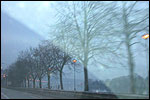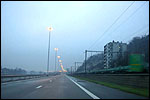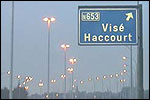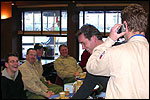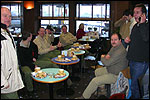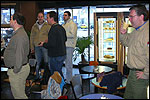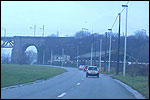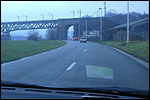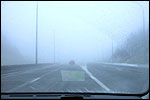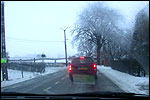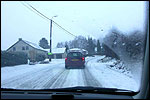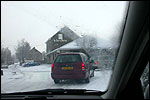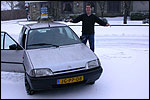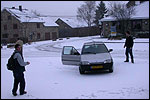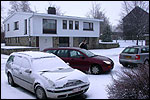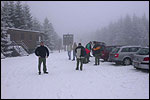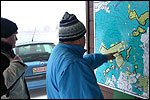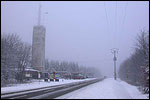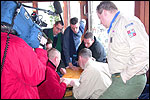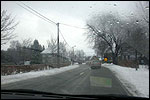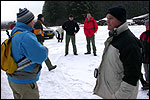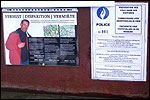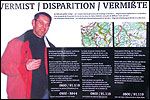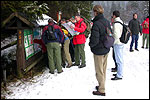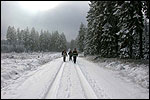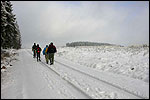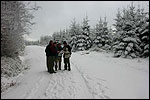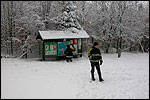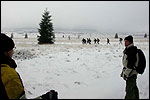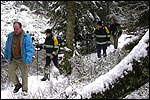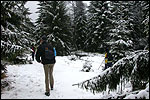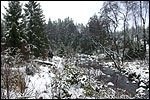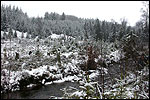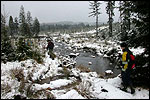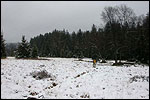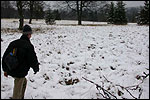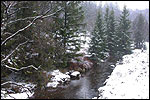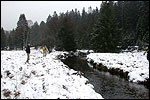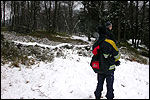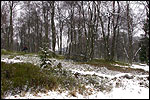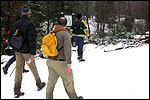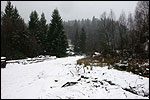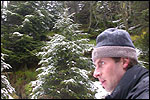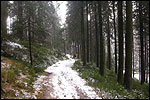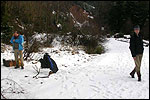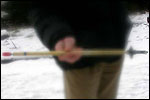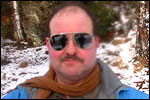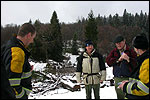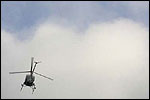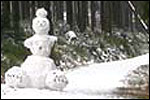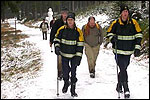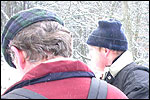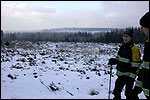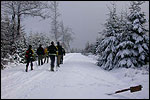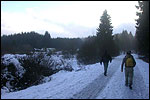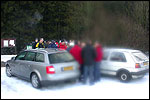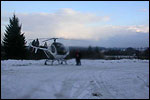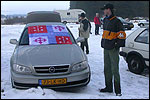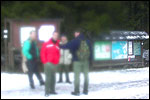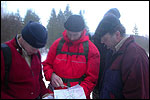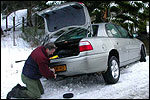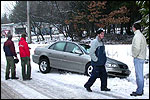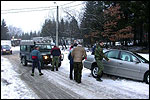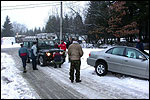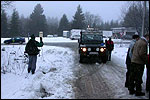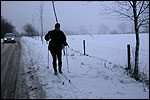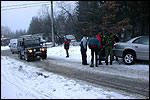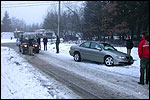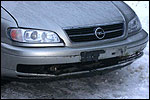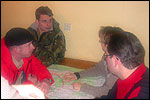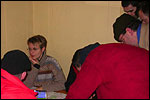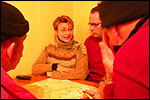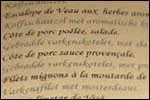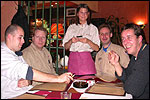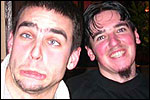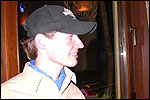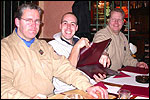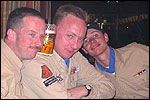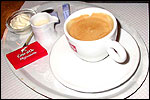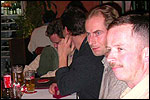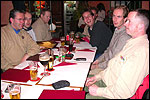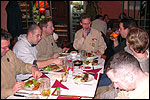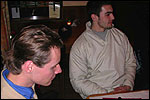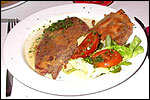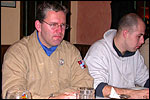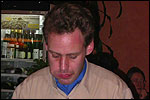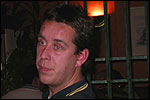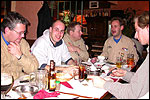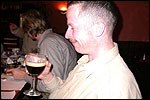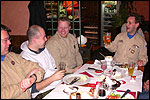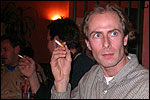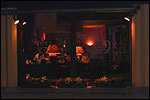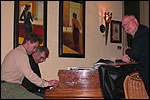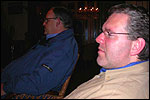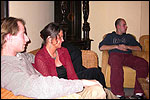| What are we doing?
January 25th, 2004 Across the Netherlands from Top to Toe: Not so We did not spare a thought. Raoul Vanderdonck not only was a fellow human being in distress, and a fellow countryman, and not only lost while busy with what binds us, all reason enough by themselves, but he had moreover gone missing in an area that's dear to our hearts: in the Hautes Fagnes (High Peat Moors), in the triangle Eupen-Malmedy-Monschau, by Sourbrodt, more exactly at Botrange. That's to the southeast of Liege and to the northeast of Baraque de Fraiture. And Baraque de Fraiture, that's right by where we walk the most beautiful march in our curriculum every year: the European March of Memory and Friendship. 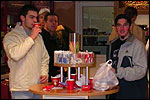 And so, when, on Tuesday, news came that a 40 year old Dutch walker from Schin op Geul was missing in the High Moors since Monday afternoon, indignant bewilderment beset us, and the emotional involvement was considerable. Yet noone had drawn any further conclusion than that. Noone felt there was anything we could or should do about it. Noone, but Fred. Fred went on, where others stopped, called the Vanderdonck family, and said something like "Say, would you like us to come help you search?". And so, when, on Tuesday, news came that a 40 year old Dutch walker from Schin op Geul was missing in the High Moors since Monday afternoon, indignant bewilderment beset us, and the emotional involvement was considerable. Yet noone had drawn any further conclusion than that. Noone felt there was anything we could or should do about it. Noone, but Fred. Fred went on, where others stopped, called the Vanderdonck family, and said something like "Say, would you like us to come help you search?".
The offer was accepted in gratitude. And so it was, that when Peter next called everybody, noone intended to live up to our originally planned agenda for the day, stage 10 of 'Across the Netherlands from Top to Toe'. 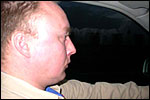 By the time I'd finished my maiden drive (it was, after all, some two weeks ago that I'd gained my driver's licence), of 250 kilometres, in Marco's Polo, we were in Visé, just above Liege, at ten in the morning, fifteen men strong. And after Marco had taken his own steering wheel back from me, ensconced in the scent of burned rubber (some nerve-racking hill-starts in the city centre of Visé preceding this, namely) and we had driven to the Signal de Botrange via Spa and Malmedy, we met the instigators there, and our team was complete, numbering 17 men: Frans, Bart, Jelle, Bert, Jan, Ronald, Fred, Harm, Thomas, Raymond, Marco, Peter, Albert, Marco, Chielie, Jochem and Henk. A turnout to be proud of. That we, it appeared later, had come across on VTM as "forty Dutch military" remains hilarious nonetheless. By the time I'd finished my maiden drive (it was, after all, some two weeks ago that I'd gained my driver's licence), of 250 kilometres, in Marco's Polo, we were in Visé, just above Liege, at ten in the morning, fifteen men strong. And after Marco had taken his own steering wheel back from me, ensconced in the scent of burned rubber (some nerve-racking hill-starts in the city centre of Visé preceding this, namely) and we had driven to the Signal de Botrange via Spa and Malmedy, we met the instigators there, and our team was complete, numbering 17 men: Frans, Bart, Jelle, Bert, Jan, Ronald, Fred, Harm, Thomas, Raymond, Marco, Peter, Albert, Marco, Chielie, Jochem and Henk. A turnout to be proud of. That we, it appeared later, had come across on VTM as "forty Dutch military" remains hilarious nonetheless.
Far from hilarious, though, was reality. During the last kilometres to Botrange, as the weather deteriorated greatly (grey, snowmisty sky and temperatures dropping sharply), we drove into a thick pack of snow (not metres, but enough for skidding capers) and the nature of the surroundings hit us in other ways too (the Belgian Ardennes - so beautiful, so unforgiving) the animated conversations halted, faces hardened, and determination grew. This got worse, when we met the Vanderdonck family, headed by Nannet, Raoul's wife, for the briefing. No jokes, about the three psychics who, independently from one another, had indicated an area that today would be searched by the Dutch dogteam, and that we were therefore to avoid in order not to waylay them. Silent attention instead, for the two mobile phone bearings conducted and the funnelshape of the area in which they both fell, as last lifesigns of Raoul. A contemplative discussion, about Raoul's psyche. Seasoned walker, organizer of marches in this area, off to walk "for an hour or so" to "make a beginning in mapping out the course" for a walk yet to be made with friends. His car found in a parking lot, the lunchpack brought along still in it, the changed shoes too. Last phonecall: "I'll be home a little later". What does a man like that do, given the area on the map? Once three areas had been identified that logically appeared to be relevant, and had not yet been searched, and having decided we would search under the leadership of, respectively, Fred, Albert and Bert, we set out for the parking lot in which Raoul's car was found. There, we split up and entered the silence of the High Moors. The area around Botrange is a vast high peat moor. And high peat moor is inaccessible. Pine forest, soit, but in between it plains of footwide, uneven, high clumps of grass - with deep holes between them, of which the bottom is not, for it consists of mud with a great capacity for suction: quickmud. Just how dangerous that is, we quickly found out. Half an hour's worth of snowstomping onwards, along the edge of barren plains, having arrived at the banks of the Helle, the river that represented the search area for our team, we there followed the sticktrail along its bank. Which is planked, and well passable. Sometimes. Between the planks there are large gaps, ve-ry large gaps at times. At best of flagstone, water running across it, of the slippery kind on which one quickly breaks an ankle, at worst consisting of high peat bog. An hour later I'd sunk into the mud up to my thigh twice and, to my horror, had found out it cost me all my strength to get that leg out again, let alone my shoe. That mud, moreover, was as icily cold as the water of the Helle. And as the bleak wind. So when it had played over me as I'd pulled Bert up from the mud, after he too had sunk into it deeply, there was little courage left, above my shoes. I thought no more, of the other teams, who were searching a similar swamp in line, and a somewhat more negotiable walking area at high speed - I only thought of red. 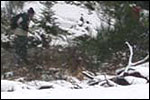 For red was the colour of the jacket Raoul was wearing. But in a landscape like this, which predominantly reminded me of the snowplains of 'Armored Fist 2', a tankgame I once played on the PC, in which enemy tanks were as unfindable as people were here, that is no longer a conspicuous colour. I realized this swiftly, when we split into subgroups, and Harm and Jan, partly clad in red as well, passed out of eyesight uncannily fast, on their way to the hills' edge atop the river valley. For red was the colour of the jacket Raoul was wearing. But in a landscape like this, which predominantly reminded me of the snowplains of 'Armored Fist 2', a tankgame I once played on the PC, in which enemy tanks were as unfindable as people were here, that is no longer a conspicuous colour. I realized this swiftly, when we split into subgroups, and Harm and Jan, partly clad in red as well, passed out of eyesight uncannily fast, on their way to the hills' edge atop the river valley.
They followed that edge, so that they could oversee the slopes below them and on the far side. Bert, Marco van Zijntergen and I walked along the left bank of the Helle downstream - two voluntary firemen, family of Raoul's, followed the right bank. That way, we could look under the fir trees by the water's edge from both sides - their branches regularly created cave-like overhangings above the river. But even in this way we were looking for a needle in a haystack - for there were thousands of those trees, and our theory rested on Raoul's keeping to the path. he could also have crept away below a pine a few hundred metres from the path, between river and forest slope, to seek shelter. 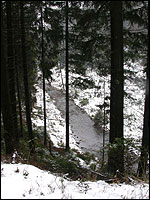 This, we deemed unlikely, though. One tries, especially if one is a seasoned walker, when running out of time before nightfall, and being alone in a vast solitude, to go where others go. The path, therefore, or better yet, a road. And because of that this, running upwards along a steep ravine, got our special attention. But those slopes were densely forested, and the road was wide, which made falling off it less plausible. And here too, we did not find Raoul. Bert especially was much outraged about that. He had, when looking at the map, absolutely expected to find Raoul here, because this was not only the most beautiful part, with the strongest lure therefore, but it also is the most dangerous, because of the sharp differences in height. This, we deemed unlikely, though. One tries, especially if one is a seasoned walker, when running out of time before nightfall, and being alone in a vast solitude, to go where others go. The path, therefore, or better yet, a road. And because of that this, running upwards along a steep ravine, got our special attention. But those slopes were densely forested, and the road was wide, which made falling off it less plausible. And here too, we did not find Raoul. Bert especially was much outraged about that. He had, when looking at the map, absolutely expected to find Raoul here, because this was not only the most beautiful part, with the strongest lure therefore, but it also is the most dangerous, because of the sharp differences in height.
And although, to this day, I believe it to be possible that we passed Raoul metres away without seeing him, and even think it possible that this would reoccur if we would search the same spots again, we were paying the best of attention. This, as even before we reached the ravine we were walking down the sticktrail along the river, and Bert sank away deeply, was proved by our find of half a skipole, of which only the top four centimetres protruded from the mud. This was a very promising find. For a half skipole like that can still be used (you can click it back on), so you don't leave it behind - unless you no longer give a damn, or it's pitch-dark and you therefore don't see where it's still sticking out of the mud. Both things absolutely relevant, to a Raoul who, after nightfall, disconcertedly tries to get out of the area as quickly as possible. But alas. By way of the walkie-talkie (the voluntary firemen had, despite the only recently introduced infamous C2000 communication system-that-does-not-work, managed to arrange for some, so that we could maintain contact between teams) we learned that that skistick could not have belonged to Raoul. A letdown. And because we had not yet been notified of such, by walkie-talkie, it was evident that the other teams had found nothing too. But we had to return now, it being half past two, because we would not make it back before dark ourselves otherwise. Back at the beginning of the ravine, at Herzogenhuegel ford, where Harm, Jan and the firemen rejoined us from the far side of the Helle, we commenced the trek back. Peeved, absolutely. That the helicopter flew above us was heartwarming, but meagre fare. The reasoning was sound, the plan was proper, and the effort large - but the High Moors had defeated us. And it felt like a personal defeat to have to go back to Nannet, and to have to tell her that we hadn't found him. The smile of the snowman we passed on the way back will haunt me for the rest of my days, as the cruel grin of the Hautes Fagnes and the Ardennes as a whole - breathtakingly beautiful, but just so unforgiving. And the moral to this story is obvious, of course: never enter such an area alone. But that didn't do Nannet any good. She went without Raoul, in the restaurant below the Signal de Botrange, where, amidst the raucous Sunday crowd coming for dinner, at the table with the maps, a graver mood reigned for sure. She kept it drier than I did, as she decided to stop searching - because she didn't have any help left for the next day, and there were no likely areas left that had not been searched. "I'll have to accept it." What brave a woman. But what a humiliating defeat. And it is that feeling that kept on dominating. Neither the accident that befell Jan, who ended up in a skid and in a ditch by the roadside with his car, between the parking lot and the Signal de Botrange, was winched out of that by a passing German LandRover and fortunately only, but unfortunately at all, suffered some damage to the front bumper, nor the animated merriness in the restaurant in Visé, where we subsequently had dinner with the larger part of our group (and where Henk told anecdotes about me and alderman Haverkort, and where Albert misbehaved as of old by, as soon as I got up to get something, placing a saltcellar on my chair where I sat me down again, and by trying to steal Raymond's meat), served to undo that sentiment. That somewhat hysterical merriness absolutely is the way to handle adversities like these - but between every laugh deep silence fell, and a grim staring into the distance. No, not even my anger over the waitress's conduct (who barked at her subordinate and kept her from completing the settling of my bill whilst I, because I was paying for Jelle, was going over to him to ask him what he'd had, so that, upon my return to the counter, I found to my astonishment that they were busy figuring out Jochem's bill - who then magnanimously apologized to me for it, but of course had only acted like the profiteer he is), and my joy over being allowed to also drive back from Visé to Haarlem in Marco's Polo, managed to remove that nasty feeling. Nannet, we are terribly sorry. But we did, at least, try. And if Fred's initiative is exemplary for the future of the Wandelsoc., then I am proud to be part of it - and to learn this from him. To your health gentlemen, manful walking there. Aken, I'm afraid, awaits. |
